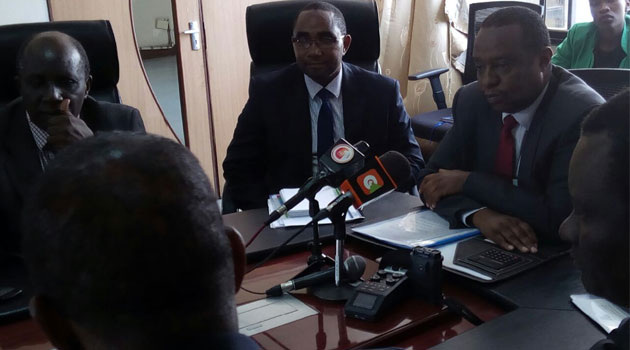
While reiterating that the pact signed by former Permanent Secretary Mark Bor is Illegal, Rotich indicated that the government’s offer was reasonable as it would see the lowest earning doctor pocket Sh295,000 monthly/SIMON NDONGA
NAIROBI, Kenya, Feb 24 – National Treasury Cabinet Secretary Henry Rotich says striking doctors need to sign a new Collective Bargaining Agreement (CBA) that takes into consideration the government’s offer and which will be implemented over a period of four years.
He warned that anything contrary will have grave implications on the economy.
While reiterating that the pact signed by former Permanent Secretary Mark Bor is Illegal, Rotich indicated that the government’s offer was reasonable as it would see the lowest earning doctor pocket Sh295,000 monthly.
He stressed that should the CBA being touted by the Kenya Medical Practitioners, Pharmacists and Dentists Union be implemented as it is, it will drive the health sector wage bill up to a whooping Sh22 billion per year.
“If that CBA was to be implemented, what it means is that the minimum salary for an intern will move to Sh295,000. It will move the wage bill of all the health workers from the current Sh9 billion to Sh22 billion. It will of course create disharmony and what will happen immediately is that all the other civil servants will come on board,” he said.
He said that this would further inflate the total wage bill for all civil servants to Sh1.7 trillion, the total revenue expected to be collected countrywide.
“Just to give you the figures, that Sh1.7 trillion is what I presented to Parliament as revenues that we will collect totally for the country. So what this means is that we will just close shop and pay salaries only with all the revenues that we will collect without doing anything else. That is the magnitude of the things we are talking about,” he cautioned.
He observed that the benchmark for any country on monies spent on wages is at 35 per cent of all its revenue and stated that anything more than that would be catastrophic.
“There is no way a country can spend all its revenue for wages. The bench mark is to only spend 35 per cent. You can spend at least a third so that you leave the other two thirds for other programs of government. There are many things that the government needs to do,” he said.
Early this month, the Cabinet approved a Sh100 billion budgetary increase to pay salaries for all Civil Servants including doctors from July 1.
Following a job evaluation exercise conducted by the Salaries and Remuneration Commission (SRC), which recommended a new salary and grading structure for civil servants across the board.
READ : Cabinet approves Sh100bn to cater for public servants pay rise
Rotich who was appearing before Joint Committees of Health and Labour and Social Welfare further explained that other health sector reforms will have to be undertaken over a period of time.
“Reforms are medium to long term, but if you wanted to end a strike by doing a long term reform today, it is not possible. If you were to supply even equipment to hospitals, there are processes that it takes to deliver equipment, financing and all that,” he stated.
“So there is no way you can now say that you will only return to work after all these reforms have been implemented. It is impossible. That is why we are saying that other health matters reforms are issues for continuous discussion,” he said.
He stated that most of the demands by doctors can only be efficiently handled by the respective County Governments since the health sector is a devolved function.
“The health sector is devolved and issues of health facilities in the counties, issues of equipment to improve the work place for doctors, those are continuous things to work on and it happens to every civil servant. Even in my office, I will not say that all my staff are enjoying a very good working environment but we continue to continuously improve the work environment for every civil servant,” he said.
Rotich also underscored the need for the doctors to take into consideration the advice of the Salaries and Remuneration Commission on the review and harmonisation of all salaries.
“I think this time round, the SRC was tasked to deal with this problem once and for all. As you know, in the past issues of CBA and Salary review have always been done in a very ad-hoc manner,” he stated.
“It has been done by every sector negotiating their own pay package and then once you negotiate a better pay package, the other civil servants will want to match that pay package and then it becomes a spiral of CBA negotiations and so on,” he stated.”
He pointed out that the job of SRC is to provide advise on equity, sustainability and productivity and anything outside the constitution will defeat the purpose.
“So there is no way you can now say that you will only return to work after all these reforms have been implemented. It is impossible. That is why we are saying that other health matters reforms are issues for continuous discussion.”
Rotich was speaking even as the Court of Appeal granted the Kenya National Commission on Human Rights and Law Society of Kenya seven more days to bring the 81-day doctors’ strike to an end.
The mediators through lawyers James Orengo and Orao Obura reported that progress had been made on a number of issues, but asked for the seven days to resolve what remains contentious.














































